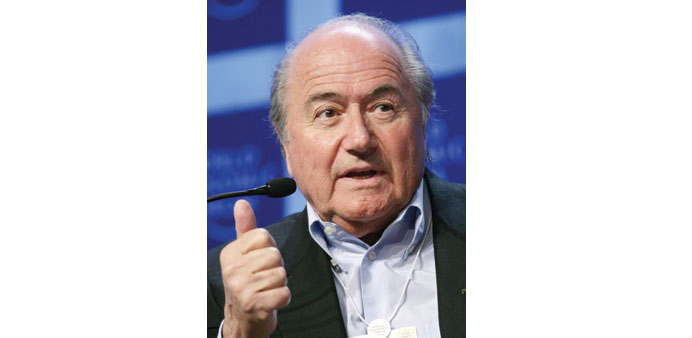AFP
Zurich
FIFA’s executive committee will decide the definitive winter dates for the 2022 World Cup finals at a meeting starting in Zurich today knowing that their ruling could ignite new battles over demands for compensation by European clubs affected by the schedule switch to winter.
The executive committee’s two-day meeting in Zurich will decide the firm dates of the tournament as well as whether South Korea or France will host the women’s World Cup in 2019.
A FIFA Task Force had recommended that the Qatar tournament be shifted to winter because of the region’s high summer temperatures, but moving the world’s most-watched sporting event has opened new divisions within the football leadership.
FIFA president Sepp Blatter has said the tournament will not run until after December 18 in a bid to reassure the English Premier League, which feared a clash with their packed Christmas programme.
But top European clubs want hundreds of millions of dollars in compensation for the disruption to their cash-rich championships which contributed three quarters of the players who appeared at the 2014 World Cup in Brazil.
Karl-Heinz Rummenigge, chairman of Bayern Munich and head of the European Club Association, said championships around the globe will be disrupted by the winter World Cup revolution.
While the former West German international striker admitted that everyone would have to compromise, he added: “The European clubs and leagues cannot be expected to bear the costs for such rescheduling. We expect the clubs to be compensated for the damage that a final decision would cause.”
But FIFA secretary general Jerome Valcke had ruled out any compensation during his press conference in Doha last month, saying a switch from the traditional summer dates to winter would not destroy football.
“There will be no compensation. I mean, they have seven years to reorganise football around the world for this World Cup,” said Valcke after a FIFA task force recommended the winter shift during a meeting in Doha.
“It’s not perfect, we know that - but why are we talking about compensation? It’s happening only once, we’re not destroying football. We are just changing the format of a season.”
Valcke said the compact World Cup in Qatar would be of immense benefit to the players and the spectators and would have a positive legacy to benefit the community.
“It’s the first time the World Cup will be held in the region. It’s going to be a special and compact World Cup. Teams will be based at one place and there would be no stress of frequent travelling and moving from place to place.”
Blatter, who will seek a fifth term as FIFA president in May, has also said that compensation is not justified.
On the other hand, FIFA paid out $70mn to about 400, mainly European, clubs after the 2014 World Cup and this could be substantially increased for 2022.
UEFA is already promising $170mn for clubs whose players are on duty at the 2016 European championships in France.
But the European clubs, who will meet at the end of March, are determined.
“We have got compensation from UEFA for its competitions. If we don’t get the same thing from FIFA you can expect an extremely virulent reaction from the ECA,” said Jean-Michel Aulas, president of French league leaders Lyon.
Other federations around the world could follow the European example and demand cash. FIFA has substantial reserves, revenues of $4.5bn are expected to be announced for the last four years, but the bill for 2022 could rise.
The meeting is also likely to have an extra layer of tension because of the presidential election which is to take place in Zurich at a FIFA congress on May 29.
This meeting will be the first chaired by Blatter since FIFA vice president Prince Ali bin al-Hussein announced he would stand against the Swiss veteran.
Portuguese football legend Figo and Dutch football chief Michael van Praag are also standing.
Blatter, 79, remains the favourite but his rivals are furiously lobbying for support.

FIFA president Sepp Blatter: the 2022 tournament will not run until after December 18.
